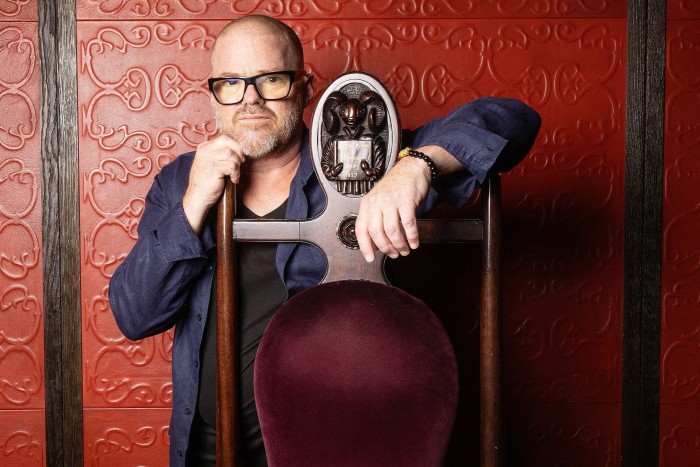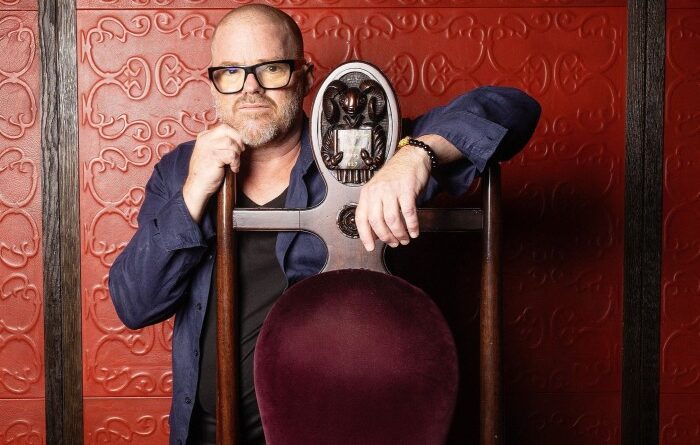‘It was mania’: Heston Blumenthal reflects on his mental health struggles
Nearly eight months after leaving a psychiatric clinic, chef Heston Blumenthal tries to understand his life and work through the prism of his new diagnosis of bipolar disorder. “The more I understand what it’s about, the more I can go back and look at my past,” he says.
In October, when he was in a mental health crisis that led to his isolation, he developed delusions in just an hour or two of sleep, turning into delusions. The experience made him reevaluate the lack of sleep he experienced earlier in his career, when he was doing 120 weeks in the kitchen and emailing co-workers before dawn. At that time he considered it a feature of his car, the cost of success. Could his behavior also have been a sign of his illness? I think it has been around for so long. It is too early to draw conclusions. “I still want to know more about myself.”
After opening The Fat Duck in 1995, the self-taught Blumenthal was dubbed the culinary Willy Wonka for his experimental approach to food, creating menus that appeal to all the senses, the famous snail porridge and bacon and egg ice-cream. In 1999 the restaurant won a Michelin star and five years later it had three, which it maintains. The success made him a celebrity, with television shows (Heston Festivals, Heston Blumenthal: The Search for Fulfillment and Heston’s Great British Food) and cookbooks as well as a variety of food at Waitrose including a Christmas pudding that is reselling for hundreds of pounds on eBay. He later opened Hinds Head in Berkshire and Dinner by Heston in London’s Knightsbridge, where we meet.
Sitting on the terrace of his two-star restaurant, shaded from the bright blue sky, Blumenthal’s shaved head and black-rimmed glasses are casual but his style is insistent, he calms his thoughts. Melanie Ceysson, his wife of about 18 months is accompanying him.
Blumenthal wants to speak out because it’s “very difficult” for many people to open up about their mental health despite awareness over the past decade. They are afraid that the scandal will affect their jobs.
Since telling her story, people she knows and people she doesn’t know have been contacting her “saying, ‘She was a brave person and it was really emotional.’ But not one person has approached me and said, ‘Okay, I have it too.’” This is despite more than a million people living with the condition in the UK, according to the charity Bipolar UK.
Blumenthal knows he can open up because he is locked in wealth, which affords him access to treatment, and is no longer essential to running a day-to-day business. “It’s very easy for me to have a platform. . . I’m not a CEO, not a COO. ”
In 2006, he sold the restaurants to a company called SL6 to focus on developing his brand and new ideas. “The power is there [worry about] bums on seats. . . When money comes in at the beginning, it can stifle free thinking and creativity.” SL6 made an operating loss last year of £1.3mn, after a profit of £2.4mn in 2022, with revenues falling from £11.5mn to £9.5mn. The business has been pressured by rising costs of labour, energy and ingredients and is focusing on increasing downtime and reducing costs.
Blumenthal says his overall role in the business has become “innovation and development. They’re my taste buds.” Pointing toward the kitchen, he admits: “These guys, they do all the work . . .” It took years to build a character and a team. If I went into the kitchen, I would cause chaos.”
The chef spoke to the senior management team about his death and is finding out what steps the company can take to support mental health and neurodiversity. In 2016, he received an ADHD diagnosis which he found “very cool” but admitted “I’m not sure it’s cool for everyone”. Learning about the different types of nerves helped him. The car alarm goes off and Blumenthal loses consciousness due to his sense of noise. “Oh, this is going to hurt,” he says, pausing until it stops. He has discovered ways to organize his life, such as using things that stimulate his memory. “I like to think of myself as a walking test.”

The mental and physical changes increased when he had a severe crisis last year, driven by a desire to “save the world”.
“I wanted to like everyone in it, because everyone is beautiful. I was throwing up ideas,” he remembers. But now if someone moves almost “Post- it note . . . I was going to be angry with the world, I was not going to say anything.” He likens his moods to those of a child the good, all the wonderful, and the bad side. You can’t have one without the other.”
Emotions intensified. I would be a danger to myself [a] potential harm to people around me. I’m not talking about physical harm, but emotional harm. I never had suicidal thoughts [before then]touch wood, fortunately they are gone.” At one point he believed there was a “gun on the table . . . It seemed real.”
This tumultuous time stirred emotions. He says: “I wrote pages. For four to five days last year he only slept an hour or two. “I was very happy. Talking about doing things. It was real mania. ” “Real madness,” Ceysson repeats, pushing back against the idea that this creativity has fruit. “You were there [having] so many thoughts there was no time to realize anything. ”
Fearing for her mental and physical health, in November, Ceysson separated her. Blumenthal stayed in a psychiatric hospital for 20 days before moving to a clinic for 40 days, which he said “was wonderful”, allowing him to undergo therapy and adapt to medication.
Blumenthal’s diagnosis is Bipolar One. Picking up my notebook, he draws lines that show the different ups and downs, according to the types of the disease – his type, which is characterized by long periods of high levels with large bursts in strength.
“The most amazing time in the world is actually [most] it is dangerous.” The lack of sleep and the state of excitement caused a strain on his body that doctors said could be dangerous. I know I was very physically ill.
Although he no longer wishes to be mad again, he does not regret the contribution that the limited translation may have had to his career. He says that any shouting in the kitchen was isolated from others. “If I had a dish in my hand, [I] it may be broken. It wasn’t like that often.” Unlike the restaurant kitchen shown in the television drama A bearhe prefers a quiet workplace.
The Michelin star system is stressful, he admits, although he would not return the star as chef Sébastien Bras asked to do in 2017, citing stress. “You can’t give up. The guide is for the public rather than the chefs. . . running a three-star restaurant will not be possible forever,” he says.
There was nothing in Blumenthal’s background that indicated he would become a chef – his father owned an office supplies business and his mother was a housewife. But his interest in food was sparked at the age of 16 during a family holiday when he ate for the first time at the Michelin-starred restaurant L’Oustau de Baumanière in Provence, near where he live there now. He later realized that being a chef “wanted the effect I got from that restaurant, the crickets, carving the table”.
In the past he attributed his driving in part to his mother not praising him. “Nothing was good enough,” he says. When he wrote his Fatty Duck He said: “This is not a book. It took ten years to write that . . . 200,000 words. ” After his death in 2020, he discovered that he had written articles about him in his career, and wrote to friends about his success. “I would like to be in a position to ask “why not I said that to him.
In addition to a week in Raymond Blanc’s kitchen and three in Marco Pierre White’s restaurant, Canteen, to see the practical side of running a restaurant, Blumenthal learned to cook. He founded Fat Duck using the proceeds from the sale of his house and a £10,000 loan from his father.
Innovation is a Blumenthal trademark. He quotes the words of Picasso: “Every child is an artist. The problem is how can we remain a musician when we grow up. ”
He says: “We build fear. He used to try to get workers to overcome this with his Museum of Crap Ideas. “[You] it had to come up with an idea that no one else had thought of and it had to be so bad that no one else could do it.”
Blumenthal says the medication has stabilized his mood, enabling him to pursue and develop his ideas. That, along with maintaining a healthy schedule, is now her top priority. “I slept well. I’m getting better at not letting my phone distract me.” Regardless of any additional activity that the elite has produced, he does not want to go back: “heavens mean descent”, he says.
#mania #Heston #Blumenthal #reflects #mental #health #struggles
